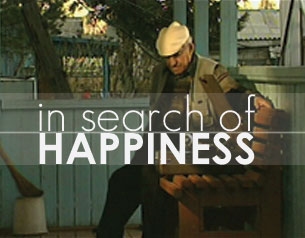In Search of Happiness
Decades before the founding of Israel, Stalin created the first Jewish homeland. Birobidzhan was, admittedly, in a remote corner of Siberia, thousands of miles from civilisation. But countless volunteers flocked there to build their own community.
 Decades before the founding of Israel, Stalin created the first Jewish homeland. Birobidzhan was, admittedly, in a remote corner of Siberia, thousands of miles from civilisation. But countless volunteers flocked there to build their own community. Eighty years later, the last surviving residents are still struggling on. One of the few remaining villagers is Boris Rak. He wanders around his dilapidated farm, staring wistfully at photos of relatives who have long emigrated to Israel. Mixing fascinating archive with images of life in Birobidzhan today, this is a poignant look at Stalin's forgotten Zion.
Decades before the founding of Israel, Stalin created the first Jewish homeland. Birobidzhan was, admittedly, in a remote corner of Siberia, thousands of miles from civilisation. But countless volunteers flocked there to build their own community. Eighty years later, the last surviving residents are still struggling on. One of the few remaining villagers is Boris Rak. He wanders around his dilapidated farm, staring wistfully at photos of relatives who have long emigrated to Israel. Mixing fascinating archive with images of life in Birobidzhan today, this is a poignant look at Stalin's forgotten Zion.
The collective farm in Birobidzhan, once the community's pride and joy, is little more than a crumbling wreck. Bricks lie scattered on the floor; the windows have long vanished. But to Boris Rak, chairman of the last Jewish collective farm, it's a memorial to his life's work. "Back then, things were easier. The times were different", he recalls.
Rak's parents were amongst the first settlers at Birobidzhan. "When the first two tractors arrived, nobody knew anything about machinery", explains Rak's wife, Masha. "Somebody needed to become the tractor driver and it was decided to offer that job to the former stable boy, Yekhil Rak." Photos of Rak's father, proudly astride his tractor, beam down from walls of the village museum.
Every spring, Boris and Masha make their way past dilapidated buildings and abandoned synagogues to visit their parents' graves. "You take the small brush and I'll take the big one", states Masha as they carefully repaint the Red Soviet Stars on each tombstone. Their own children; "were among the first to leave" Birobidzhan for Israel. "Things are hard for them at the moment but they don't intend to come back", laments Masha. When Boris and Masha die, there will be no-one left to paint red stars on their graves.
Despite their advanced age, the remaining citizens of Birobidzhan, preserve the well established rhythm of life. Boris still tends his small plot of land, naming his animals after Russian political leaders. "We felt a bit sorry when we sent Yeltsin for meat", he writes to his son. "Your mum and I miss him". Masha runs the small village museum. But her memories are fading and she stumbles over details.
All their achievements now seem bittersweet. Boris was recently awarded the title of 'Honorary Citizen of the Jewish Autonomous Region'. He received a telegraph of congratulations from the government. But at the same time, the collective farm was declared bankrupt and its assets were sold off. Then, he was invited to a celebration of the 75th anniversary of his school. When he arrived; "There was no one else there from my class. Many of them are dead".
Ironically, many residents of this first Jewish homeland have forgotten the dates of Jewish holidays and no longer maintain religious traditions. But their strong sense of cultural heritage remains. Every so often, Boris will retrieve an old gramophone from the cupboard, put on a dusty Jewish record and sing quietly along in Yiddish.
FULL SYNOPSIS
